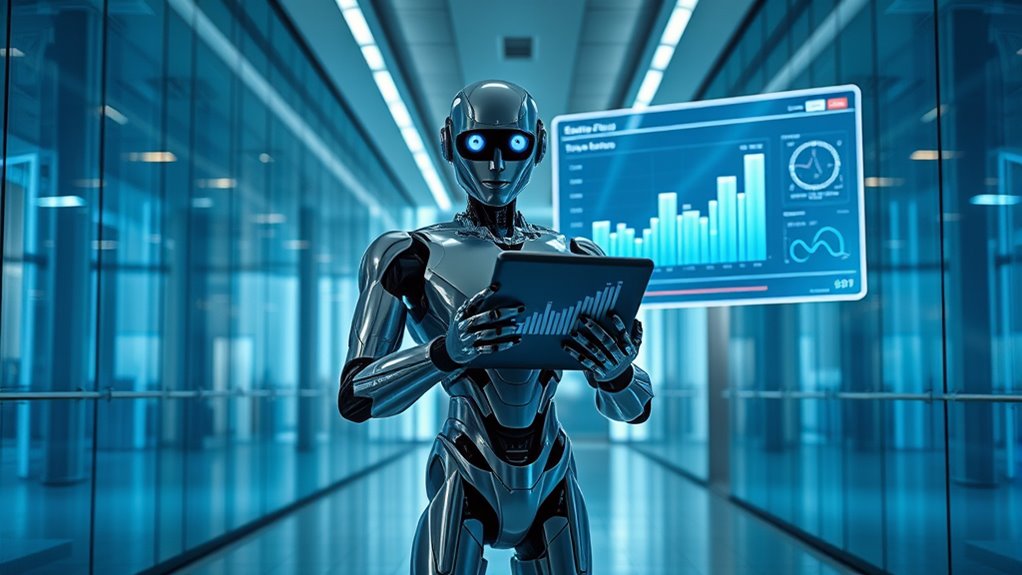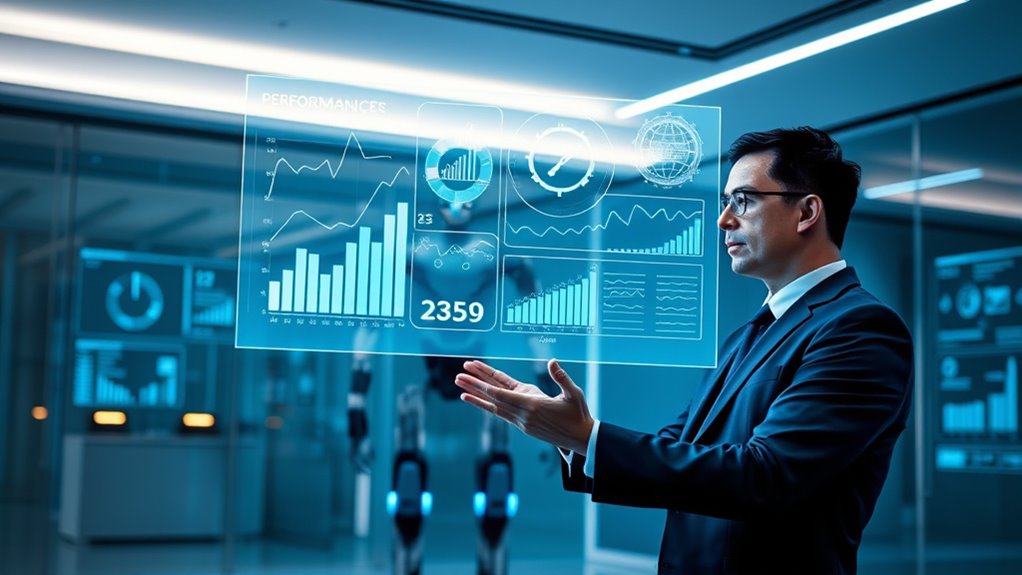Imagine your performance review done entirely by AI, acting as a robo-boss. These systems analyze extensive data to provide unbiased, real-time, and personalized feedback while reducing human biases and increasing fairness. They save time by automating routine tasks and offer transparent, consistent evaluations. As organizations increasingly adopt AI for performance management, you’ll want to understand how these digital supervisors impact fairness, privacy, and engagement—continue exploring to discover more about this emerging workplace trend.
Key Takeaways
- AI-driven reviews offer objective, data-based assessments reducing human bias and favoritism.
- Real-time feedback from AI enables timely employee development and performance adjustments.
- Automated analysis streamlines evaluation processes, saving time and operational costs.
- Continuous monitoring ensures fair, standardized evaluations based on measurable performance metrics.
- Ethical considerations include data privacy, transparency, and bias mitigation in AI performance reviews.
The Rise of AI in Performance Management

The rise of AI in performance management is transforming how organizations evaluate and develop their employees. Today, 75% of companies plan to incorporate AI-based tools into their review processes, reflecting a significant shift. The market for performance management software is expected to more than double, growing from USD 5.82 billion in 2024 to USD 12.17 billion by 2032, with 83% of businesses prioritizing AI in their strategic plans. As a result, 92% of executives anticipate increasing their AI investments over the next three years. This rapid adoption is fueling workforce changes, with an estimated 97 million people working in AI roles by 2025. Overall, AI’s integration signals a new era of enhanced efficiency, strategic focus, and technological advancement in employee management. Compatibility between human and AI evaluators will be crucial for ensuring fairness and effectiveness in these new systems. Additionally, ongoing concerns about AI vulnerabilities highlight the importance of developing trustworthy and secure AI solutions in sensitive areas like performance review. Ensuring ethical AI deployment will be vital as organizations navigate this technological shift.
How AI Enhances Review Accuracy and Objectivity

AI markedly improves review accuracy and objectivity by leveraging vast amounts of data to analyze performance with precision. You benefit from continuous monitoring of key indicators like sales, engagement, and turnover risk, which helps identify trends invisible to human reviewers. This allows for faster aggregation of metrics across teams and supports real-time feedback, making assessments more responsive. AI applies standardized criteria consistently, reducing favoritism and subjective judgments. It focuses on measurable outputs such as tasks completed and hours logged, minimizing reliance on anecdotal evidence. Advanced metrics like precision and F1 scores ensure balanced evaluations. Additionally, AI models are trained to ignore irrelevant demographic data, lowering biases. Regular audits and model calibration maintain fairness, resulting in more accurate, objective reviews that reflect actual performance. Implementing bias mitigation techniques can further enhance fairness and reduce unintended discrimination in evaluations. Incorporating personal development techniques can further enhance employee growth and motivation based on review insights.
The Benefits of Reduced Human Bias in Evaluations

When AI handles performance evaluations, you benefit from fairer and more objective assessments. It reduces unconscious biases that can influence human judgments and guarantees all employees are evaluated against the same standards. This consistency can lead to a more equitable workplace where performance truly reflects effort and results. Incorporating color accuracy and other technological advancements ensures evaluations are based on accurate, data-driven insights rather than personal opinions. Bias mitigation is essential to improve employee experience and retention, ensuring assessments are based on performance metrics rather than personal opinions. Additionally, leveraging self-awareness tools can further refine evaluation processes by highlighting individual strengths and areas for growth. Using neuroscience research in evaluation systems can help tailor feedback to individual cognitive styles, enhancing overall effectiveness. Integrating predictive analytics can also help identify trends in employee development and potential future performance issues, fostering proactive management strategies.
Fairness and Objectivity Enhanced
By relying on continuous, real-time data, performance evaluations become more objective and less influenced by personal feelings or biases. This method promotes a more consistent evaluation process, reducing the impact of momentary fluctuations in performance. This consistency can lead to more reliable assessments and better-informed decision-making. This approach eliminates recency bias, ensuring past performance isn’t overshadowed by recent events. Automated reviews enforce standard criteria, reducing opportunities for manipulation or favoritism, and increase transparency so you understand how evaluations are made. AI-driven assessments also demonstrate a 33% reduction in bias, with projections of a 50% decrease by 2025. Overall, these data-based processes foster trust, improve accuracy, and support fair comparisons across teams, leading to more equitable outcomes and a clearer understanding of your strengths and development areas. Additionally, utilizing performance metrics and emotional alignment principles can help organizations foster a more positive and balanced work environment, further enhancing fairness and employee satisfaction. Incorporating privacy considerations ensures that employee data is handled responsibly and ethically throughout the evaluation process, including adherence to privacy policies and data security standards. Leveraging advanced encryption solutions can further safeguard sensitive evaluation data from potential cybersecurity threats.
Unconscious Bias Reduction
Have you ever wondered how unconscious biases influence performance reviews? Biases often happen unknowingly, skewing evaluations and affecting fairness. Increasing awareness through unconscious bias training helps managers recognize and diminish these biases. Methods like workshops and case studies boost self-awareness and neuroplasticity, aiding change. Feedback from multiple sources, such as peers and subordinates, creates a balanced view, decreasing bias perceptions. Using clear, objective criteria further limits subjective judgments. The combination of awareness, diverse perspectives, and measurable standards minimizes bias’s negative impact. AI enhances this process by analyzing data for bias detection, ensuring consistent, fair evaluations. Research shows that AI can identify patterns of bias that humans might overlook, leading to more equitable assessments. Additionally, employing algorithmic fairness techniques can further reduce disparities in evaluations. Incorporating data privacy challenges into evaluation systems ensures that sensitive information remains protected during bias mitigation efforts. Implementing standardized evaluation protocols helps establish uniform criteria across departments, reducing variability. For example, integrating automated bias detection tools can preemptively flag potential issues before evaluations are finalized. Together, these strategies foster a review environment where decisions are based on facts, not feelings, promoting fairness and employee trust.
Consistent Evaluation Standards
AI-driven evaluation systems bring consistency to performance reviews by applying uniform standards across all employees. By collecting real-time data, AI guarantees reviews are based on current, thorough information rather than sporadic observations. This reduces bias from recent events or favoritism, creating fairer assessments. AI identifies patterns and trends, offering objective, personalized feedback rooted in actual performance. It uses both historical and current data to predict areas for improvement, leading to more accurate conclusions. Additionally, AI maintains uniformity across departments and teams, ensuring everyone is evaluated using the same criteria. Automated processes eliminate discrepancies caused by different managers’ styles, promoting fairness. Overall, standardized evaluations foster trust, minimize variability, and support equitable treatment—key benefits of reducing human bias in performance assessments.
Efficiency Gains: Saving Time and Resources

AI streamlines performance reviews, cutting down evaluation time considerably. It also automates administrative tasks, saving resources and reducing costs. By making processes more efficient, you can focus on strategic priorities rather than routine work. Research indicates that AI assistance can increase task productivity by approximately 66%, further emphasizing its potential to optimize organizational workflows.
Reduced Evaluation Time
Automation of routine tasks considerably reduces the time managers spend on performance evaluations, allowing them to focus on strategic initiatives. AI handles data collection and analysis swiftly, delivering real-time insights into employee performance. It generates feedback using standardized structures, minimizing manual revisions and speeding up the review process. AI-driven tools can write extensive performance reports in minutes, saving hours traditionally spent on drafting and editing. Continuous monitoring enables managers to receive immediate updates, facilitating timely adjustments. Automated workflows streamline the evaluation process, ensuring consistency and reducing delays. By saving time on routine tasks, managers can dedicate more energy to coaching and development. Overall, AI accelerates performance reviews, making them more efficient and freeing up valuable resources for high-impact activities.
Cost-Effective Processes
Implementing AI tools in performance reviews can substantially cut costs by streamlining processes and reducing resource expenditure. You’ll automate routine tasks, freeing time for strategic work, and optimize resource allocation by pinpointing where human effort is most needed. AI reduces operational costs associated with manual data analysis and paperwork, allowing processes to scale without increasing staff. For example, companies like CometChat have cut admin work by 90%. Here’s how AI boosts efficiency:
| Benefit | Impact |
|---|---|
| Time Efficiency | Automates tasks, saves time |
| Resource Allocation | Targets areas needing human input |
| Cost Reduction | Cuts operational and admin expenses |
Addressing Ethical and Privacy Concerns

Addressing ethical and privacy concerns is vital as organizations increasingly rely on AI-driven performance reviews. Nearly half of employees worry about privacy invasion from AI monitoring systems, and handling sensitive data raises cybersecurity risks. Continuous digital scrutiny can cause discomfort and lower productivity, eroding trust in the organization. To prevent legal issues, companies must guarantee compliance with privacy laws and establish clear data handling protocols. Bias and discrimination also pose significant challenges; AI trained on biased data may unfairly impact minority groups and overlook necessary accommodations, risking legal repercussions. Transparency is essential—employees need to understand how evaluations are generated. Implementing oversight, accountability measures, and ethical frameworks ensures fairness. Regular system evaluations help maintain trust, fairness, and respect for employee privacy in AI-powered performance reviews.
The Challenges of Integrating AI Into HR Processes

Integrating AI into HR processes presents several technical and organizational hurdles that organizations must navigate carefully. Compatibility issues arise when legacy HR systems don’t seamlessly connect with advanced AI tools, complicating deployment. Data standardization is another challenge; inconsistent formats hinder AI analysis and accuracy. Rapid organizational growth strains scalability, making it hard to expand AI solutions smoothly. High-quality, representative training data is tough to obtain, risking biased or ineffective outcomes. Additionally, AI algorithms require ongoing updates to maintain performance. Change management barriers include workforce resistance, as employees may distrust AI assessments or fear job displacement. HR staff often lack AI literacy, slowing adoption. Without clear ROI metrics, skepticism persists, and shifting processes can disrupt established workflows, demanding careful planning and communication.
Future Trends Shaping AI-Driven Performance Reviews

Future trends in AI-driven performance reviews are transforming the way organizations evaluate and develop their employees. You’ll see AI enhance feedback quality and goal clarity by analyzing large data sets, offering personalized insights for growth. Continuous feedback loops become standard, allowing for timely adjustments. AI also predicts workforce trends, helping you proactively address challenges. Workflow automation across tools boosts operational efficiency, making the review process smoother. Advancements in AI performance metrics improve accuracy, while integration with HR systems enables real-time tracking and personalized development plans. Emerging technologies like agentic and generative AI support autonomous decision-making and immersive training. Future AI systems will likely incorporate augmented reality, creating more engaging and effective performance review experiences, ultimately reshaping how you receive feedback and grow within your organization.
Impact on Employee Engagement and Trust

AI’s role in performance reviews considerably impacts employee engagement and trust by providing consistent, data-driven feedback that many employees find more fair and transparent than traditional methods. With over 50% trusting AI more than humans and 65% believing AI offers fairer evaluations, you may feel more confident in your feedback. Additionally, more than 60% find AI-generated goals useful, and 75% prefer AI reviews over traditional ones. This shift can evoke strong emotions:
- A sense of fairness, knowing your performance is judged objectively.
- Increased confidence from real-time, personalized insights.
- Relief from biases and emotional influences.
- Motivation through clear, data-backed goals.
These factors can boost your engagement and foster a deeper trust in the evaluation process.
Preparing for the Era of Robo-Bosses

As organizations increasingly adopt AI-driven performance management tools, preparing for this shift is crucial to guarantee smooth integration and maximize benefits. You should focus on developing clear strategies for ethical AI implementation and ensuring transparency in how evaluations are conducted. Training managers to effectively use AI tools is essential, so they can interpret data accurately and provide meaningful feedback. Regularly gathering employee feedback helps identify potential concerns and improves acceptance. Given that 75% of organizations plan to incorporate AI into reviews, proactive planning ensures you stay ahead of the curve. Emphasize understanding AI’s capabilities—like bias reduction and predictive analytics—and foster a culture of trust and continuous learning. Proper preparation will enable your organization to leverage AI’s advantages while addressing ethical and operational challenges.
Frequently Asked Questions
How Do AI Systems Handle Complex or Nuanced Employee Behaviors?
You might wonder how AI systems handle complex or nuanced employee behaviors. They analyze language, sentiment, and patterns in your digital output to identify subtle cues. By comparing behaviors against company values and using custom rubrics, AI can recognize underlying motives or emotions. Regular data updates help the system adapt, providing more accurate insights. While not perfect, AI aims to offer fair, objective evaluations of behaviors that are hard to quantify.
What Training Is Necessary for Managers to Interpret Ai-Generated Reviews?
You need training to effectively interpret AI-generated reviews. Focus on understanding how to read performance dashboards, spot missing context, and identify potential biases. Learn to differentiate between data-driven insights and incomplete signals. Develop skills to combine AI outputs with your observations, ensuring feedback is personalized and fair. Plus, stay updated on evolving AI tools and ethical considerations, so you can use these reviews as helpful starting points, not final judgments.
How Are Employees Informed About Ai’s Role in Their Evaluations?
You might think you’re in the dark about AI’s role in your evaluations, but many companies go above and beyond to keep you informed. They use emails, employee portals, onboarding sessions, workshops, dashboards, and face-to-face chats to explain how AI contributes to your review. Managers often clarify AI’s inputs during discussions, ensuring transparency. When you’re well-informed, you’re more likely to trust and engage positively with your performance process.
Can AI Detect and Address Unconscious Biases in Performance Data?
You’re wondering if AI can spot and fix unconscious biases in performance data. The answer is yes. AI uses pattern recognition, text analysis, and diverse training datasets to identify biases related to demographics or language. It can flag biased feedback for review and help organizations address issues proactively. However, regular audits and human oversight are vital to guarantee AI’s fairness and prevent inheriting existing biases from old data.
What Legal Implications Exist for Ai-Driven Performance Assessments?
The legal implications of AI-driven performance assessments are massive and far-reaching. You risk violating anti-discrimination laws like Title VII or ADA if your algorithms perpetuate biases. Privacy laws such as GDPR or CCPA could be broken if you mishandle employee data. Non-compliance with wage, hour, or employment laws may lead to lawsuits. Regular audits, human oversight, and transparent processes are essential to avoid costly legal battles and reputational damage.
Conclusion
As AI transforms performance reviews, you’re on the brink of a revolution that will change HR forever. Robo-bosses promise unparalleled objectivity and efficiency, but they also challenge trust and ethics. Embrace this technological leap wisely, because ignoring it is like missing the chance to ride the wave of the century. Prepare yourself for a future where human and machine collaborate seamlessly—it’s not just evolution; it’s an upheaval of the very fabric of work!









